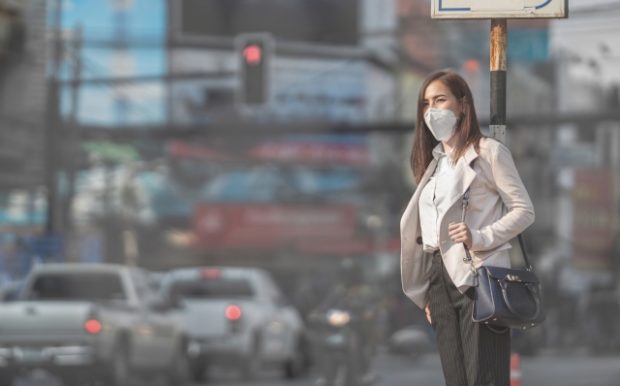Air pollution linked to 15% of coronavirus deaths, says study

In East Asia, which has some of the highest levels of harmful pollution on the planet, the authors found that 27% of COVID-19 deaths could be attributed to the health effects of poor air quality. Image: Istock.com/torwai via AFP Relaxnews
Long-term exposure to air pollution may be linked to 15% of COVID-19 deaths globally, according to research published Tuesday that highlights the health risks posed by greenhouse gas emissions.
Previous research has shown how air pollution from exhaust fumes and factories takes two years off the life expectancy of every man, woman and child on Earth.
Now experts in Germany and Cyprus say they have estimated the proportion of deaths from coronavirus that can be blamed on the exacerbating effects of air pollution.
Their study, published in the journal Cardiovascular Research, drew on health and disease data from the United States and China relating to air pollution, COVID-19 and SARS— a serious lung disease similar to COVID-19.
They combined this with satellite data of global exposure to particulate matter — microscopic particles — as well as ground-based pollution monitoring networks, to calculate to what extent air pollution can be blamed for COVID-19 deaths.
In East Asia, which has some of the highest levels of harmful pollution on the planet, the authors found that 27% of COVID-19 deaths could be attributed to the health effects of poor air quality.
In Europe the proportion was 19 %, compared with 17% in North America.
“If both long-term exposure to air pollution and infection with the COVID-19 virus come together then we have an adverse effect on health, particularly with respect to the heart and blood vessels,” said paper co-author Thomas Munzel.
He said that air pollution made known COVID-19 risk factors such as lung and heart problems more likely.
Specifically, the team noted that particulate matter appeared to increase the activity of a receptor on lung cell surfaces, ACE-2, which is known to be involved in the way COVID-19 infects patients.
“So we have a double hit: air pollution damages the lungs and increases the activity of ACE-2, which in turn leads to enhanced uptake of the virus,” said Munzel, a professor at the University Medical Center of the Johannes Gutenberg University, Mainz.
‘Remedy is reduce emissions’
The authors stressed that attributing COVID-19 deaths to air pollution did not mean that pollution itself was killing people with COVID-19 — though they didn’t rule out such a cause-effect linkage.
Jos Lelieveld, of the Max Planck Institute for Chemistry, told Agence France-Presse that the research suggested “the pollution particles are a co-factor in aggravating the disease.”
He said their estimates suggested that more than 6,100 COVID-19 deaths in Britain could be attributed to air pollution. In the U.S. that figure is around 40,000.
The authors said that without a fundamental change in how cities power themselves, including a transition to clean and renewable energy sources, air pollution would continue to kill huge numbers of people even after the pandemic recedes.
“The pandemic ends with the vaccination of the population or with herd immunity through extensive infection of the population,” they wrote.
“However, there are no vaccines against poor air quality and climate change. The remedy is to mitigate emissions.” RGA
RELATED STORIES:
Air pollution killed 500,000 newborns in 2019 — global study
How air pollution drives food delivery use, plastic waste in China — study
For more news about the novel coronavirus click here.
What you need to know about Coronavirus.
For more information on COVID-19, call the DOH Hotline: (02) 86517800 local 1149/1150.
The Inquirer Foundation supports our healthcare frontliners and is still accepting cash donations to be deposited at Banco de Oro (BDO) current account #007960018860 or donate through PayMaya using this link.